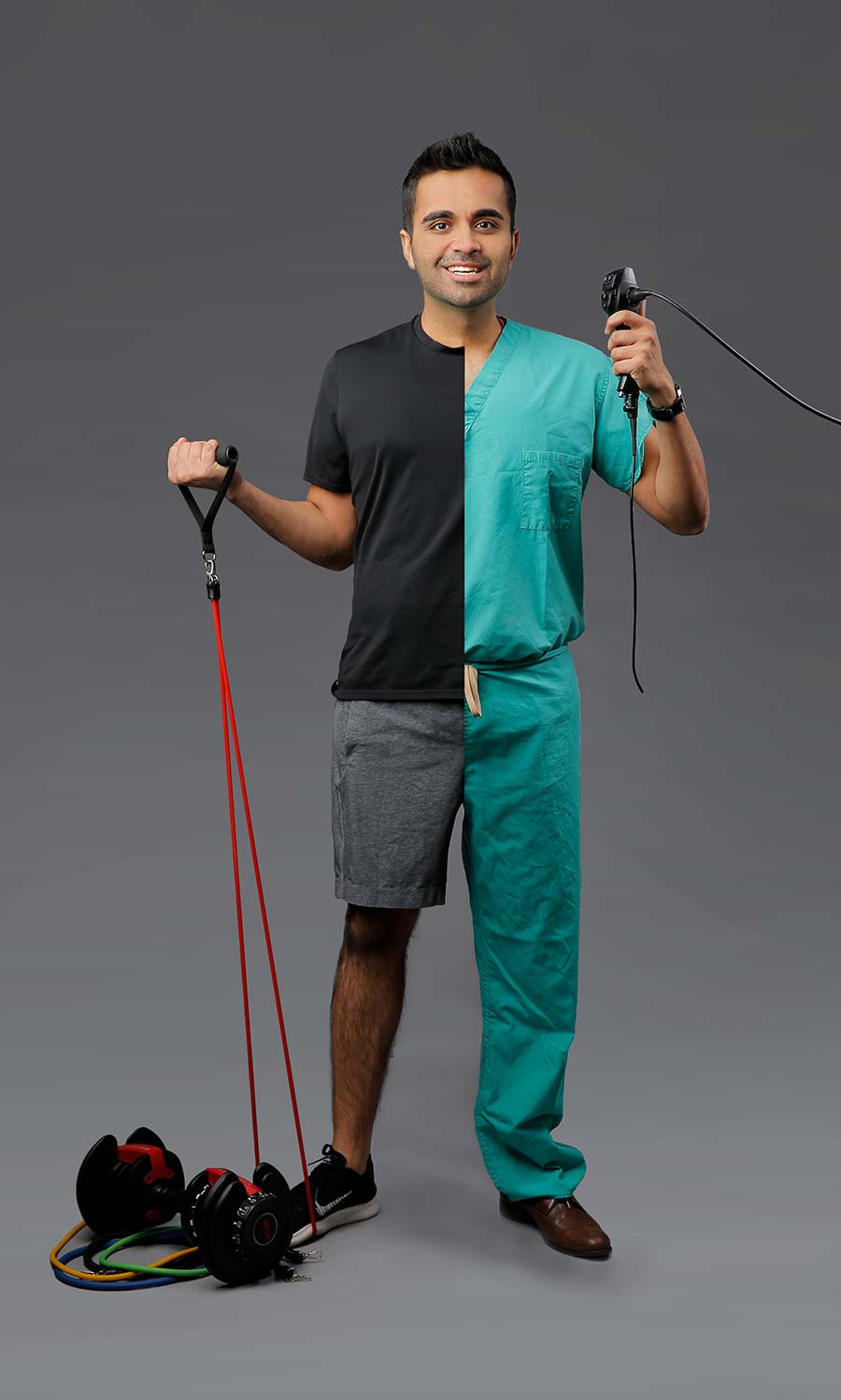Physician, heal thyself
Two doctors at each end of the age spectrum reap the benefits of maintaining healthy lifestyles.
Doctors try to always know what’s best for their patients, but they don’t always know what’s best for themselves. With demanding work schedules and little free time, they often let exercise and healthy eating fall by the wayside.
But many doctors understand they must set examples for their patients, and that staying active, fit, and healthy is a lifelong responsibility. For example, Dr. Jamin Brahmbhatt realized he needed to change his lifestyle in his 30s, while Dr. Gabe Mirkin still is preaching about healthy living in his 80s. They make the extra effort to “practice what they preach.”
Dr. Jamin Brahmbhatt, PUR Clinic, Clermont
About two years ago, Jamin tipped the scales at 200 pounds and realized he needed to go on a “fitness journey.” So he sought a personal trainer and got serious about exercise. He lost 30 pounds, but he says exercise is only 20 percent of the reason. The other 80 percent is proper diet, which is essential for weight loss and a balanced life, he says.
As a busy physician with three children, as well as a schedule filled with travel and speaking engagements, Jamin says it would be easy to let exercise slide. But he says he owes it to his kids to stick with it.
“I had to do it,” says Jamin, co-director of the PUR (Personalized Urology and Robotics) Clinic at South Lake Hospital in Clermont. “I need to be a good father. Men tend to live five years less than their wives. I want to be around and spend those extra five years with them.”
While most health organizations recommend 30 minutes of exercise a day, five days a week, Jamin pushes a little longer with about three hours a week of training at Orangetheory Fitness in Clermont. He participates in a high-intensity class designed to burn as many calories as possible in one hour using the treadmill, rowing machine, and weights.
Jamin does much of his training before sunrise, then focuses on patients the rest of the day, and he’s become a more effective communicator.
“I want to be a better role model for my patients with weight issues, so they actually believe what I say when it comes out of my mouth,” he says.
Jamin also is co-founder, with business partner Dr. Sijo Parekattil, of Drive for Men’s Health, an annual event that celebrates five years in June. They travel around the country to raise health awareness and “encourage as many men as we can to improve their lives,” Jamin says.
He also hopes to inspire fellow physicians to not be hypocrites when it comes to good health.
“You have to play the part,” Jamin says. “People look up to us.”

Dr. Gabe Mirkin, The Villages
Gabe’s father died from diabetes and his brother and sister also are diabetics. Gabe, however, is rail thin at age 82, and he most assuredly credits his longevity to a lifetime of exercise. He ran marathons for many years before injuries took their toll in his mid-40s and he switched to bicycling.
He was a practicing physician for more than 50 years in Washington, D.C., and is best known as a sports medicine doctor and longtime radio host on health issues.
Now retired in The Villages, Gabe and his wife, Diana, pedal 150 miles a week on their custom-made tandem trike with the Florida Panthers Tandem Bike Club, despite Diana’s rheumatoid arthritis and osteoporosis. Diana, 75, is a former city planner who quit her job to open a healthy cooking school in Washington, and the couple have co-authored several books on nutrition.
“I took up bicycling because there’s no impact,” Gabe says. “I can’t run across the street now, but I can cycle. I do interval workouts…and that’s really hard on your body, and I can do that now four times a week.”
Gabe still dispenses medical advice in a newsletter and by speaking to local groups. He delivers a blunt message:
• A diet including red meat, processed meat, sugar-added foods, sugar drinks, and fried foods increases the risk for cancer, heart attacks, diabetes, and obesity. Sugar is poison.
• Fruits, vegetables, whole (not ground) grains, beans, seeds, and nuts are helpful.
• Belly fat causes problems. If someone is storing fat in their belly, they are at risk for premature death.
• If you want to lose weight, calorie counting doesn’t work; intermittent fasting works. Don’t eat anything after 6pm and drink only water until the next morning.
“When you see how successful it is, you start cleaning out your kitchen so you don’t get tempted,” Gabe says. “If I had a house full of bagels, there’s no way in hell I’d weigh what I do. I don’t have any more willpower than anybody else does. I just know that I don’t have any willpower so I don’t expose myself (to temptation).”

